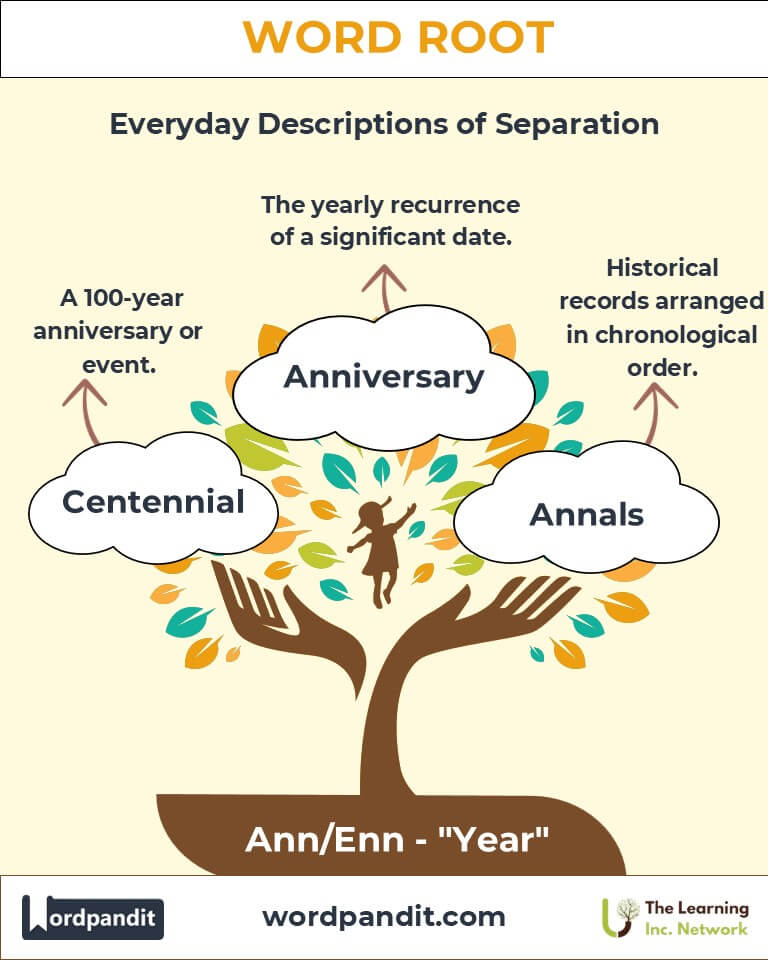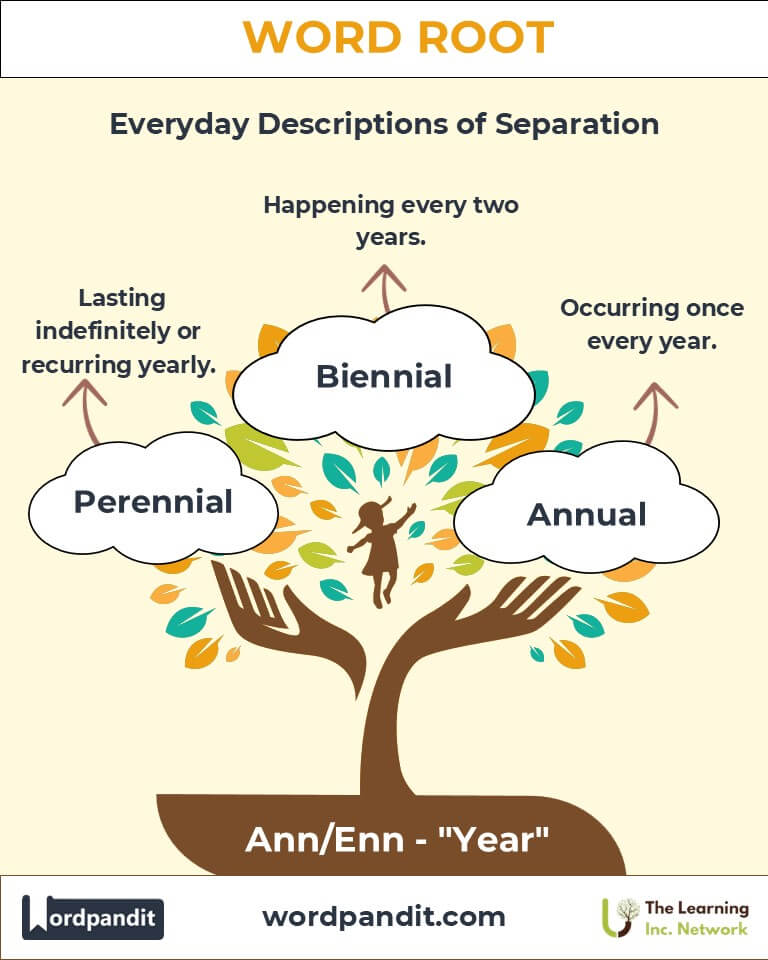Ann/Enn: The Timeless Root of Years and Cycles
Explore the versatile root "ann/enn," derived from the Latin word for "year." Found in words like "annual" and "biennial," this root captures the essence of time, cycles, and periodicity, reflecting its significance in language, history, and specialized disciplines.

Table of Contents
- Introduction: The Timeless Essence of "Ann/Enn"
- Etymology and Historical Journey
- Mnemonic: Unlocking the Power of "Ann/Enn"
- Common "Ann/Enn"-Related Terms
- "Ann/Enn" Through Time
- "Ann/Enn" in Specialized Fields
- Illustrative Story: "Ann/Enn" in Action
- Cultural Significance of "Ann/Enn"
- The "Ann/Enn" Family Tree
- FAQs about the "Ann/Enn" Root
- Test Your Knowledge: "Ann/Enn" Mastery Quiz
- Conclusion: The Enduring Legacy of "Ann/Enn"
Introduction: The Timeless Essence of "Ann/Enn"
What do anniversaries, annual reports, and biennial festivals have in common? They all trace their linguistic roots to "ann" or "enn," derived from the Latin words annus (year) and annales (chronicles). Pronounced an and en, these roots convey the cyclical and temporal nature of time. From ancient rituals marking the passage of years to modern systems of tracking progress, "ann/enn" reflects humanity's enduring connection to the concept of time.
Etymology and Historical Journey
The Latin word annus meaning "year," evolved through Old French into Middle English, enriching the lexicon with terms like "annual." Over centuries, the root adapted into words describing various time intervals, from biannual (every two years) to perennial (lasting indefinitely). The root also influenced expressions in historical chronicles, such as annales in Roman records, highlighting its role in preserving the memory of time.
Mnemonic: Unlocking the Power of "Ann/Enn"
Picture a calendar flipping through months, marking each year with a celebratory firework on New Year’s Day. This vivid image links the root "ann/enn" to time, cycles, and yearly traditions.
Mnemonic Device: "Ann marks the anniversary; Enn spans the endless years."
Common "Ann/Enn"-Related Terms
- Annual (AN-yoo-uhl):
Occurring once every year.
Example: "The company’s annual meeting is scheduled for March."
- Biennial (bye-EN-ee-uhl):
Happening every two years.
Example: "The biennial art fair attracts collectors from all over the world."
- Perennial (pe-REN-ee-uhl):
Lasting for an indefinite time or recurring yearly.
Example: "Roses are a perennial favorite among gardeners."
- Anniversary (an-uh-VUR-suh-ree):
The yearly recurrence of a significant date.
Example: "They celebrated their 25th wedding anniversary with a grand party."
- Centennial (sen-TEN-ee-uhl):
Pertaining to a period of 100 years.
Example: "The town organized a centennial celebration for its founding."
"Ann/Enn" Through Time
- Annual:
Originated in Roman traditions, where yearly sacrifices and events structured civic and religious life.
- Perennial:
Transitioned from botanical use to metaphorical language, symbolizing enduring qualities.
- Centennial:
Gained prominence during landmark celebrations of cities, such as the 1876 Centennial Exposition in the United States.
"Ann/Enn" in Specialized Fields
- Botany:
Perennial describes plants that live for more than two years, signifying endurance.
- Education:
Annual reports are essential for tracking institutional progress.
- History:
Chronicles, or annales, document the sequence of years in ancient and medieval records.
- Event Planning:
Terms like biennial guide the organization of recurring events.
Illustrative Story: "Ann/Enn" in Action
Every summer, the small village of Riverview held an annual fair celebrating local traditions. This year marked its centennial, drawing visitors from around the country. Amid the festivities, plans for a biennial farmers’ market were unveiled, ensuring the perennial spirit of community and growth endured for generations.
Cultural Significance of "Ann/Enn"
The root "ann/enn" reflects humanity’s fascination with cycles and timekeeping. Ancient Roman annales served as precursors to modern calendars, while annual celebrations like New Year’s Eve remind us of the passage of time. The concept of marking anniversaries, from personal milestones to national commemorations, unites cultures in honoring the past and looking to the future.
The "Ann/Enn" Family Tree
Explore related roots and terms:
- Chron (Greek: "time"):
Chronology: The sequence of events in time.
- Temp (Latin: "time"):
Temporary: Lasting for a limited time.
- Diurn (Latin: "day"):
Diurnal: Relating to daily cycles.

FAQs About the "Ann/Enn" Root
Q: What does "ann/enn" mean?
A: "Ann/enn" originates from the Latin word annus, meaning "year." It represents time, cycles, and intervals, particularly in the context of annual or periodic events.
Q: What is the difference between "annual" and "biennial"?
A:
- Annual: Refers to something occurring once every year (e.g., annual celebrations like birthdays or company meetings).
- Biennial: Refers to something happening every two years (e.g., a biennial art exhibition). These terms often confuse people because of their similarity, but the difference lies in the frequency.
Q: What is a centennial?
A: A centennial is the 100th anniversary of an event. It marks a century-long milestone, often celebrated with grandeur, such as a city’s founding or a historic event.
Q: Does "perennial" only describe plants?
A: No, while "perennial" is widely used in botany to describe plants that live for more than two years, it also has broader applications. For instance, it can refer to something enduring or recurring, like "perennial problems" or "perennial favorites."
Q: What are "annales"?
A: The term annales refers to year-by-year records or chronicles used in ancient and medieval history to document significant events. For example, Roman historians like Tacitus used annales to record their narratives.
Q: Is "biennial" the same as "biannual"?
A: No, they are different:
- Biennial: Occurs once every two years.
- Biannual: Happens twice a year. This distinction is crucial in understanding scheduling contexts.
Q: How is "anniversary" used in modern contexts?
A: An anniversary marks the annual recurrence of a special date. It is used in both personal contexts (e.g., wedding anniversaries) and broader commemorations (e.g., the anniversary of a historical event or organization).
Test Your Knowledge: Ann/Enn Mastery Quiz
1. What does "ann/enn" mean?
2. What does "perennial" mean?
3. What term describes an event every 100 years?
4. What is the difference between biennial and biannual?
5. Which word describes a yearly event?
Conclusion: The Enduring Legacy of "Ann/Enn"
The root "ann/enn" weaves the fabric of time, connecting language to the cycles of life, nature, and history. From annual celebrations to centennial milestones, it anchors our understanding of years and continuity. As we mark the passage of time, "ann/enn" remains a testament to humanity's enduring relationship with the rhythms of life.











